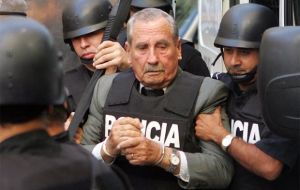MercoPress. South Atlantic News Agency
Former Uruguayan military dictator condemned to 25 years in jail
 “Goyo” Alvarez, one of the most representative figures of the 1973/1985 military dictatorship
“Goyo” Alvarez, one of the most representative figures of the 1973/1985 military dictatorship Former Uruguayan military dictator retired General Gregorio Alvarez was condemned this week to 25 years in jail for his involvement in the deaths of leftist activists and repeated violation of human rights during the 1973-85 dictatorship.
Judge Luis Charles also condemned retired Navy official Juan Carlos Larcebeau to 20 years in jail. In December 2007 Alvarez had been sent to jail to await trial over the killings of 37 activists, most of them Argentines, while Larcebeau was being tried over 29 deaths.
Alvarez, 82, did not attend the hearing Thursday due to alleged health problems.
The lawyer for the prosecution Oscar Lopez Goldaracena described the ruling as one which “dignified the victims.”
Gregorio “Goyo” Alvarez, in 1973, when the military coup was head of the Combined Forces Command in charge of fighting the urban guerrilla movement known as Tupamaros.
He was later named Commander of the Uruguayan Army and in 1981 was nominated by the Junta of generals de facto president until 1985, when the return of democracy.
He is regarded as one of the most representative figures of the military regime which began combating the guerrillas but continued with the political system, particularly left wing and radical activists including Marxist inspired organizations such as the Communist party which at the time was legal.
During the years of dictatorship, the Uruguayan and Argentine military regimes worked closely together to dispose of their political enemies. Death squads acted on both sides of the River Plate killing and kidnapping, and exchange of prisoners was common practice.
The ruling came just three days before a presidential election that according to opinion polls has incumbent candidate Jose Mujica, a former guerrilla leader as one of the main presidential hopefuls next Sunday.
Also at stake at the ballot box Sunday is a referendum on whether to repeal an amnesty of crimes committed by military and police officers during the dictatorship. The amnesty law of 1986 ratified by a referendum in 1989 protected military personnel and police officers from criminal prosecution for human rights violations during the dictatorship.
This week also the Uruguayan Supreme Court ruled that the 1986 amnesty bill was unconstitutional. The case involved the elimination of a woman teacher, communist activist in a military garrison in 1974. The ruling is considered a lead case for further demands.




Top Comments
Disclaimer & comment rulesCommenting for this story is now closed.
If you have a Facebook account, become a fan and comment on our Facebook Page!